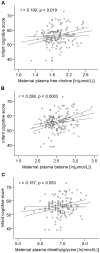Early second trimester maternal plasma choline and betaine are related to measures of early cognitive development in term infants
- PMID: 22916264
- PMCID: PMC3423345
- DOI: 10.1371/journal.pone.0043448
Early second trimester maternal plasma choline and betaine are related to measures of early cognitive development in term infants
Abstract
Background: The importance of maternal dietary choline for fetal neural development and later cognitive function has been well-documented in experimental studies. Although choline is an essential dietary nutrient for humans, evidence that low maternal choline in pregnancy impacts neurodevelopment in human infants is lacking. We determined potential associations between maternal plasma free choline and its metabolites betaine and dimethylglycine in pregnancy and infant neurodevelopment at 18 months of age.
Methodology: This was a prospective study of healthy pregnant women and their full-term, single birth infants. Maternal blood was collected at 16 and 36 weeks of gestation and infant neurodevelopment was assessed at 18 months of age for 154 mother-infant pairs. Maternal plasma choline, betaine, dimethylglycine, methionine, homocysteine, cysteine, total B12, holotranscobalamin and folate were quantified. Infant neurodevelopment was evaluated using the Bayley Scales of Infant Development-III. Multivariate regression, adjusting for covariates that impact development, was used to determine the associations between maternal plasma choline, betaine and dimethylglycine and infant neurodevelopment.
Results: The maternal plasma free choline at 16 and 36 weeks gestation was median (interquartile range) 6.70 (5.78-8.03) and 9.40 (8.10-11.3) µmol/L, respectively. Estimated choline intakes were (mean ± SD) 383 ± 98.6 mg/day, and lower than the recommended 450 mg/day. Betaine intakes were 142 ± 70.2 mg/day. Significant positive associations were found between infant cognitive test scores and maternal plasma free choline (B=6.054, SE=2.283, p=0.009) and betaine (B=7.350, SE=1.933, p=0.0002) at 16 weeks of gestation. Maternal folate, total B12, or holotranscobalamin were not related to infant development.
Conclusion: We show that choline status in the first half of pregnancy is associated with cognitive development among healthy term gestation infants. More work is needed on the potential limitation of choline or betaine in the diets of pregnant women.
Conflict of interest statement
Figures




References
-
- Zeisel SH, Blusztajn JK (1994) Choline and human nutrition. Annu Rev Nutr 14: 269–296. - PubMed
-
- Ueland PM (2011) Choline and betaine in health and disease. J Inherit Metab Dis 34: 3–15. - PubMed
-
- Albright CD, Tsai AY, Friedrich CB, Mar MH, Zeisel SH (1999) Choline availability alters embryonic development of the hippocampus and septum in the rat. Brain Res Dev Brain Res 113: 13–20. - PubMed
Publication types
MeSH terms
Substances
Grants and funding
LinkOut - more resources
Full Text Sources
Other Literature Sources
Medical

